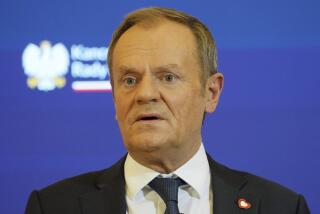Polish Officials, Walesa Will Hold Talks Today : Solidarity Leader to Meet With Government, Church Leaders in Effort to End Labor Unrest
- Share via
WARSAW — For the first time in more than six years, Solidarity leader Lech Walesa will meet today with representatives of Poland’s Communist government in an effort to halt the latest round of nationwide labor unrest.
Officials of Solidarity, the outlawed trade union movement, emerged Tuesday night from strategy sessions at St. Brygida’s Church in Gdansk and told reporters that Walesa will meet in Warsaw with Internal Affairs Minister Czeslaw Kiszczak and a representative of the Roman Catholic Church.
Walesa himself left the church with the Catholic bishop of Gdansk, Tadeusz Goclowski, and was believed to be en route to Warsaw.
Union confirmation that the talks will take place came hours after the government announced that it is ready to meet with Walesa as soon as he calls an end to the strike at the Lenin Shipyard in Gdansk.
But Piotr Konopka, an aide to Walesa, declared Tuesday, “For now, the strike is still on.”
There was no immediate government response to the announcement by Solidarity, but the contacts between Solidarity and the government, through church intermediaries, suggested that the regime had given in on its demand that the shipyard strike end before any talks.
“This is a historic moment,” Tadeusz Mazowiecki, a senior Solidarity adviser, told journalists.
Today’s talks, which may be a preliminary to the “round-table” discussions proposed by the government last week, are likely to focus on the government’s hope to quickly end the 10 strikes still in progress.
The talks will open on the eighth anniversary of the Gdansk accords between the government and Solidarity that recognized the first free trade union movement in the Communist bloc.
“The talks begin exactly on the anniversary of the August agreements,” Solidarity adviser Adam Michnik said. “The results of this meeting . . . will be very important for the fate of the country and the world.”
The proposal for round-table discussions was made last week by Kiszczak, who would serve as chairman. The round-table group is expected to include representatives of the officially sanctioned labor federation, the church and other groups.
Kiszczak said the talks would be open to everyone who has supported constitutional order--the phrase is generally used to indicate the primacy of the Communist Party--and would be held unconditionally.
As recently as Monday, Walesa said that the strikes would continue until the government indicated its willingness to discuss the legalization of Solidarity, which has been outlawed since 1982. No formal talks have been held between Walesa and government leaders since then.
Government spokesman Jerzy Urban was asked at a news conference Tuesday whether Solidarity’s status will be considered at the meetings. He replied: “The subject matter is open. All subjects can be discussed.”
Ongoing Negotiations
Since the proposal was aired, intermediaries closely associated with the church have shuttled between Warsaw and Gdansk as the government and Solidarity leaders negotiated terms for the talks.
The government first held out for an end to all of the strikes, which began Aug. 15 in the coal mines of Silesia and at their peak involved 20 state-run enterprises. The strikers, meanwhile, all listed as a primary demand the legalization of Solidarity.
Solidarity leaders have refused to end the walkouts, fearing that the government’s willingness to talk would fade quickly in that case.
Sources close to the negotiations indicated that one compromise under discussion calls for Walesa to end the shipyard occupation and then, after the talks begin, to call for a halt to the other strikes. Strike committees in the other struck enterprises have already voted to empower Walesa to negotiate their first demand--legalization of Solidarity--thus giving him their authority to call for an end to the remaining strikes.
However, the Solidarity announcement that the first meeting between Walesa and Kiszczak will take place with the shipyard strike still in progress suggested that the union’s tough stance had prevailed.
“A decision to end the strike would have to be made jointly by the inter-factory strike committee, the Gdansk shipyard strike committee and the workers themselves,” Michnik said.
It would be unusual, however, for the strikers to go against the recommendations of Walesa and other Solidarity leaders.
Second Wave of Strikes
The current wave of strikes is the second to hit Poland this year. The earlier outbreak, in April and May, ended without the government giving in to demands for the legalization of Solidarity, but there were high wage settlements that triggered an inflationary spiral and severely damaged the government’s economic reform plan.
Public complaints about a 60% rate of inflation began to build, and, when pay increases promised to miners in Silesia failed to materialize on Aug. 15--payday--the strikes began. The government said the strikes are causing losses in badly needed export earnings of $1.5 million a day.
Losses mounted with the strikes in the nation’s two Baltic seaports, Szczecin and Gdansk. The government press agency reported Tuesday that 59 barges had been turned back from the port of Szczecin, many of them scheduled to carry coal to West Germany.
More to Read
Sign up for Essential California
The most important California stories and recommendations in your inbox every morning.
You may occasionally receive promotional content from the Los Angeles Times.













